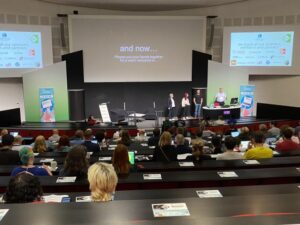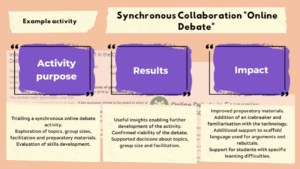The in-person ALT Conference experience
By Paul Astles
How did it feel to be at a conference “in person” again?
With the uplifting melodies and syncopated rhythms of some of my favourite bands soundtracking my journey to Manchester, not even the (at times) slow moving motorway traffic could take the shine off what I anticipated to be an interesting few days ahead. The last time I was in Manchester it rained a lot; this time was no different.
As I drove deeper into the city centre, the rain added a rather lovely percussive addition to the music in my car. I was not quite sure what to expect as I approached the conference venue, would there be a sense of community? Or would it feel like a commute on the underground in London?
I collected my lanyard as I was welcomed to the event, and I immediately felt at ease. It became apparent, I would be in for a warm and friendly welcome which set up an excellent couple of days with colleagues from all over. Aside from a few moments of ‘where is this room I am trying to find’ and turning left instead of right, it felt very inclusive and engaging throughout.
Some key takeaways
I would firstly encourage you to visit the Open University Learning Design team’s Twitter account where we covered a range of content in ‘real time’ throughout the event, these related to both online and in-person presentations. Some key takeaways for me at the face-to-face section of the conference though are considered here.
Day 1 was very poignant and thought-provoking opener to the event; it encouraged the delegates to consider issues of digital poverty and emotional engagement with learning when it is placed online. An excellent talk sensitively highlighted the need to consider how to combat a “two tiered” experience of learning between those who are online and those who are not within an educational experience. I took from it the importance of designing an experience that is inclusive for the audience you have.

Day 2 was jam packed with talks and keynotes. My experience of the sessions I was able to attend was very positive. When considering ethics in learning technology a standout message was to not see this as a one-off event or tick box exercise but an iterative process that may involve many stakeholders. A key thing to reflect on here would be the application of the ethical framework developed by ALT, this is something I will take with me in to my own practice and discussions with colleagues generally. I enjoyed the strong focus of student voice and the importance of this on design, several talks related to co-creation of content and discussed methods not too dissimilar to the OU CDSP approach.
A strong message that came from one specific talk was the idea of only providing the “right information at the right time” to avoid cognitive overload. A concept I think that is easy to assume is present in thinking at the point of creating learning experiences but can easily be overlooked.
In addition to the in-person attendance, another learning designer in our team, Shawndra Hayes-Budgen, and I also presented a video poster, ‘Using an asynchronous approach to ‘learning design sessions’ within a STEM faculty’ , for the online portion of the conference. This reviewed the work we’ve recently started to do with module teams where we enable them to pick up some Learning Design elements in their own time but with the guidance and support of their learning designer.
Working with Students to Enhance Learning and Learner Experiences
By Tehnaz Crook and Dot Coley
We had the opportunity to present some of our Curriculum Design Student Panel (CDSP) work at ALT-C (the Association for Learning Technology Annual Conference 2022). The CDSP is one of several student voice initiatives at the Open University (OU) and was set up specifically to enable staff engaged in module design and production to work more directly with students. The panel creates opportunities for student input to inform the early development of activities, materials and tools. This student-centred approach provides students with the ability to directly impact early development work and to engage with the OU.
The conference programme, with face-to-face and online sessions over a 3-day duration, provided a wide variety of interesting topics and thought-provoking sessions to attend. We were registered for online attendance, and while we were able to present our video poster asynchronously, we were provided with an opportunity to answer questions from participants during a scheduled slot.
Due to heavy workloads and absences due to a perfectly timed re-emergence of Covid, we had a very short turnaround to create our CDSP video-poster ‘Working with Students to Enhance Learning and Learner Experiences’.
The process was challenging at first and learning to use a new creative tool was tricky. However, with the support from colleagues and family members roped in to help, including many giggles and re-takes of recorded clips, we had the finished product ready in time!

The CDSP video-poster was well received by the online audience members who engaged with us via the chat function. The facilitator commented that the panel “comes across as an excellent initiative”. Some delegates asked insightful questions as to how panel members were recruited and wanted to learn if we faced any difficulties recruiting students to the panel. Other questions related to how the panel was supported and managed. We mentioned the groundwork our Student Research Project Panel colleagues do for us in recruiting members to the panel twice annually, ensuring ethics are managed and students are not over surveyed.
Attending the conference, albeit online, was a good experience, the event was well organised and the online sessions we attended flowed smoothly without a hitch. Having the opportunity to attend asynchronously was especially beneficial because this enabled us to engage and absorb information in our own time. The online atmosphere was conducive to knowledge-sharing, the facilitators and audience were engaged and supportive of each other and there was a keen interest in learning from each other. We look forward to attending such online events again, and hopefully in person when the opportunity arises!
*** *** *** ***
If you’d like to watch any of the Keynote speeches, plenaries and presentations from this year’s conference, ALT have added them all to one handy playlist on the ALT YouTube channel.

